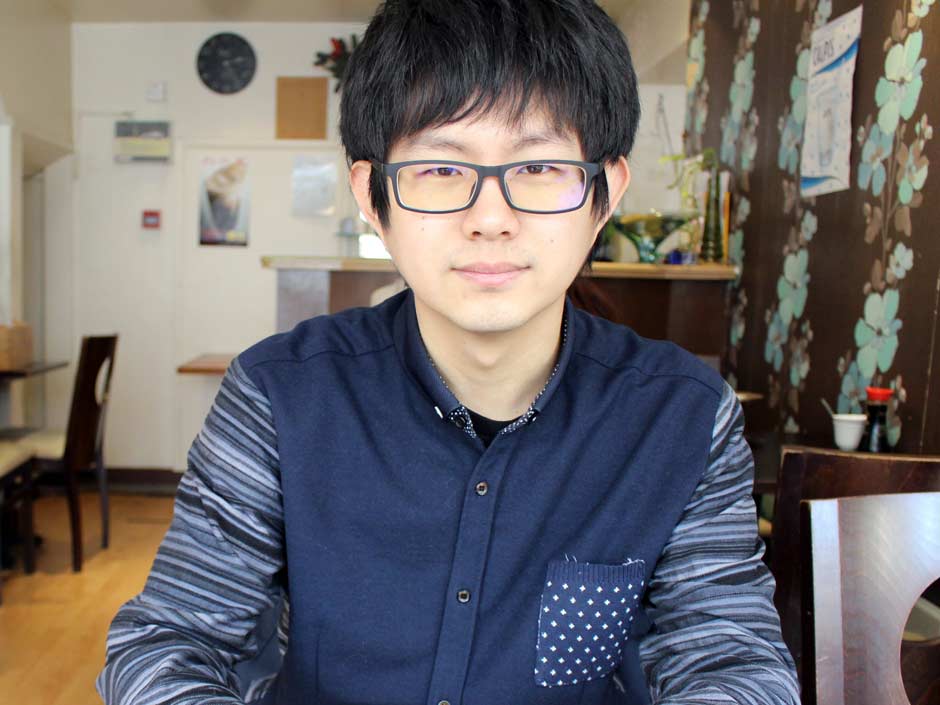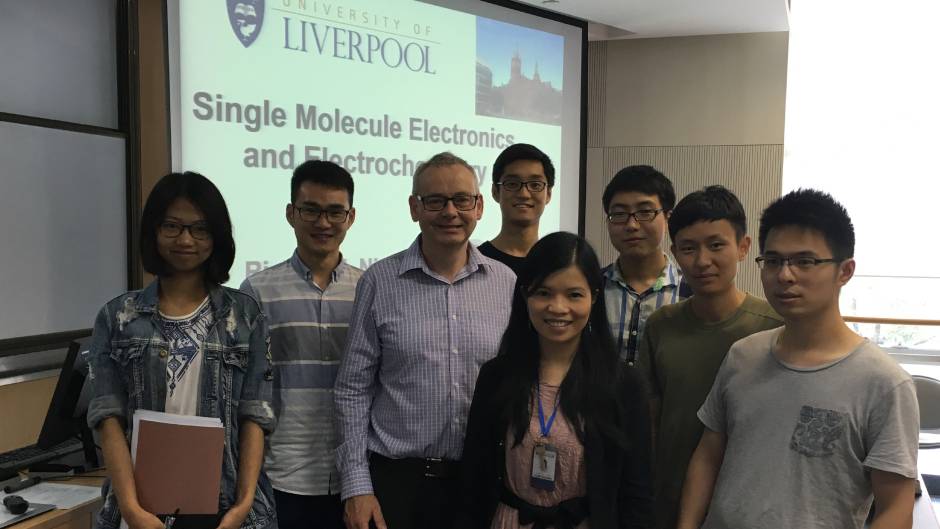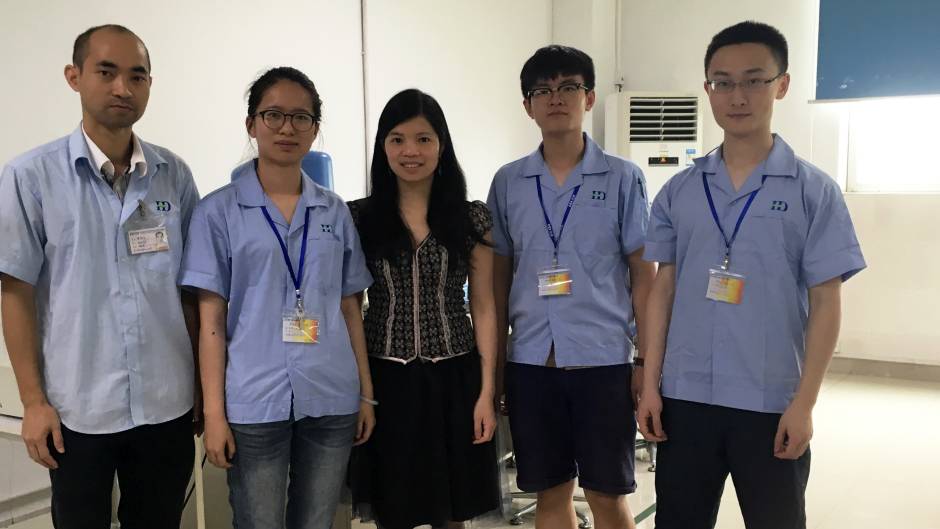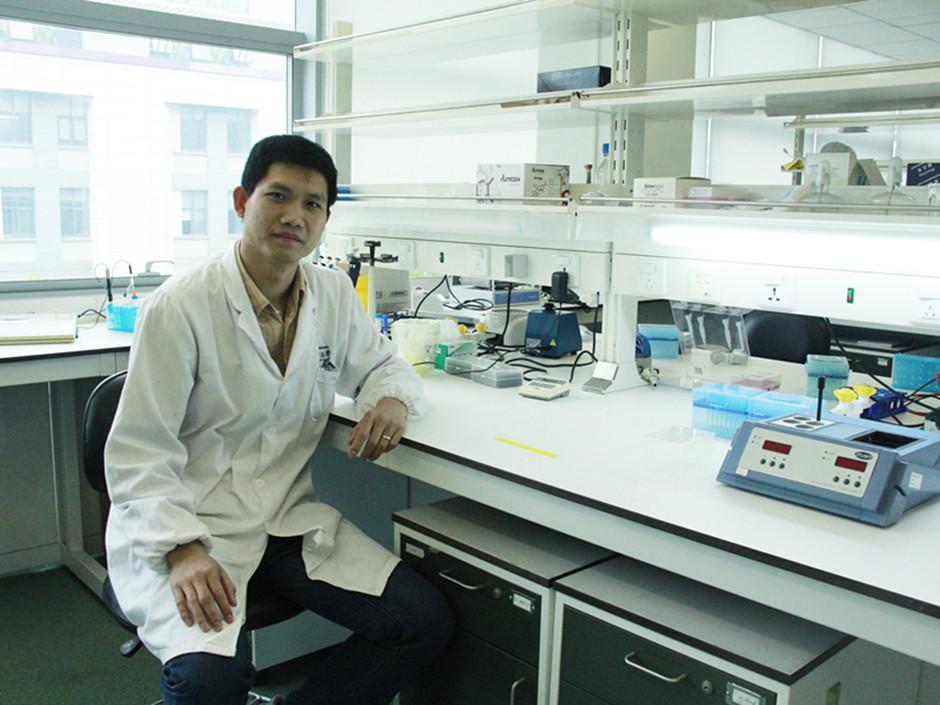08 Aug 2016
Students from the Department of Chemistry at Xi’an Jiaotong-Liverpool University have had research published in international journals that could have significant impact on their respective research fields.
Helping reduce the global dependence on oil
Jiawei Liao, one of the first students to graduate from MRes Advanced Chemical Sciences at XJTLU, had his paper, which contributes to the search for alternatives to petroleum-based fuels, published in the journal ‘Microporous and Mesoporous Materials’.

The paper, titled Molecular simulation studies of hydrogen enriched methane (HEM) storage in Covalent Organic Frameworks, was based on Jiawei’s degree project and looks at the storage of hydrogen-enriched methane in nanoporous materials.
Dr Lifeng Ding, Jiawei’s supervisor and a lecturer from the Department of Chemistry at XJTLU, explained that while methane is seen as a clean fuel that could reduce global dependence on oil, the gas is difficult to store and its wide use as a fuel is yet to be realised.
Researchers around the world are therefore looking for nanoporous materials to act as fuel tanks. Nanoporous materials are technologically useful for a wide range of applications such as energy storage and conversion in fuel cells.
Jiawei sought to find out the correlation between the characteristics of the materials and their hydrogen and methane (aka hythane) adsorption capacities.
He used a computational approach to find what characteristics would maximise the adsorption capacity of porous materials, discovering that there was a ‘complex interplay' of the properties of the materials, temperature and bulk composition.
Jiawei explained: “We hoped to find an ideal microporous material that can be utilised to store hydrogen-enriched methane for use in clean vehicles, or at least find characteristics that will increase the hythane adsorption capacity of the materials.
“Once a suitable microporous material is found it will be able to be used as an efficient method to store vehicle energy and facilitate a solution to the problem of our energy consumption’s impact on the environment.”
Jiawei plans to pursue PhD study in Japan after his graduation in July. He said of his time at XJTLU: “The most significant thing I developed at XJTLU was self-study skills, while the rigorous academic environment improved my thinking, which has become more logical and rational. Studying at XJTLU also helped my ability to search for and write papers in English.”
‘Mesoporous and Microporous Materials’ is one of the leading journals in the field of porous materials and is also the official journal of the International Zeolite Association.
Understanding the surface modification of nanomaterials
Alumnus Ruochen Liu, who graduated from BSc Applied Chemistry last year, published a paper investigating the surface modification of nanomaterials.
Published in collaboration with his supervisor Dr Graham Dawson, a lecturer from the Department of Chemistry, Ruochen’s paper Dopamine Surface Modification of Trititanate Nanotubes: Proposed in-situ Structure Models investigated the structure of dopamine-modified trititanate nanotubes, a nanomaterial made from bulk titanium dioxide, a natural pigment powder that is commonly used in suncreens and for colouring products white.

Dr Dawson explained that the surface modification of nanomaterials to affect their properties was an important field of research, with “far ranging” potential applications in catalysis and energy generation and storage.
He added that poly-dopamine coatings have gained significant research attention in recent years, as their use as a coating for many kinds of materials, including in biomedical applications has become more widely understood.
“However, research of the structure has been limited to the poly-dopamine itself, removed from any surface, rather than as a coating,” he said.
Ruochen and team’s research paper sought to better understand the structure of the poly-dopamine coating itself. The research investigated the trititanate nanotubes ‘in-situ’ using solid state nuclear magnetic resonance and powder X-ray diffraction. Two models for self-assembled dopamine were proposed, namely, individual monomer units linked together by stacking and mono attached units interacting through hydrogen bonding.
Ruochen said: “The results indicated that poly-dopamine coatings may involve more monomer physical assembly than previously thought, and offers an insight into the functional use of poly-dopamine. This thin dopamine coating may have applications in multifunctional biocompatible systems such as wound healing and tissue engineering.”
“This work should make a significant contribution to the field of surface modification of nanomaterials,” added Dr Dawson.
Ruochen Liu is now studying MSc Materials for Energy and Environment at University College London.
The paper was published in Chemistry - A European Journal, a highly ranked multidisciplinary chemistry journal, with an impact factor of 5.77, published by Wiley.
08 Aug 2016
RELATED NEWS

Chemistry at the University Liverpool ranked 1st in United Kingdom
In the Times Higher Education subject rankings Chemistry at the University of Liverpool ranked 1st for outputs, 2nd overall and 3rd for impact. This is a goo...
Learn more

Molecular electronics study could lead to smaller, more powerful devices
A research team from the Department of Chemistry at Xi’an Jiaotong-Liverpool has measured for the first time the charge transfer of single-molecule junctions...
Learn more

PhD students learn crucial skills on industry internship
Three PhD students at Xi’an Jiaotong-Liverpool University took part in a two-week industry internship to build their skills in making rechargeable lithium io...
Learn more

PhD student awarded junior travel grant from prestigious international society
Fan Bu, a final year PhD student in the Department of Biological Sciences, Centre for Neuroscience, at Xi’an Jiaotong-Liverpool University (XJTLU), received...
Learn more








